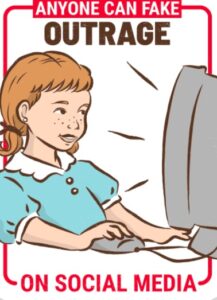 Professor J.P. Jones in our Law School nominated this word, in particular as a verb. Professor Jones notes that the verb appeared in a recent Economist article. Not a verb I use, it got me interested if for no other reason than to acquire a new action verb. I’m coming off a semester full of dull and boring “is/are/was/were” verbs of being by under-read students.
Professor J.P. Jones in our Law School nominated this word, in particular as a verb. Professor Jones notes that the verb appeared in a recent Economist article. Not a verb I use, it got me interested if for no other reason than to acquire a new action verb. I’m coming off a semester full of dull and boring “is/are/was/were” verbs of being by under-read students.
The OED gives us a succinct definition that any attorney might cherish, “to object, dispute, or find fault unfairly or without good reason.” The noun form means the same thing, a frivolous objection. Our word’s origin? Latin cavilla, where it meant a gibe or jeer.
No, we don’t ever encounter those today, now do we? Why has “cavil” fallen out of use, then? Here I have no good answer, only some hard and rather dispiriting facts.
The word has suffered a nigh-exponential decline in frequency of usage since the year 1750, falling from over 2.5 occurrences per million words to just over .006 per million. Curiously, cavil rebounded since 2017 and has enjoyed a minuscule revival to just over .009 per million. Still scarce, it appears to have made a comeback in educated circles.
I shall cling to it in an era of palpable stupid prose in once-respectable publications. Goodness, I’m Scrooge-like suddenly. Enough caviling.
The blog will continue in 2024 and I may sneak in one more holiday-themed post before lighting the Yule Log.
If you have a word or metaphor you enjoy, send them by e-mail (jessid -at- richmond -dot- edu) or leaving a comment below.
See all of our Metaphors of the Month here and Words of the Week here.
Image: random Googling for “Fake Outrage.”